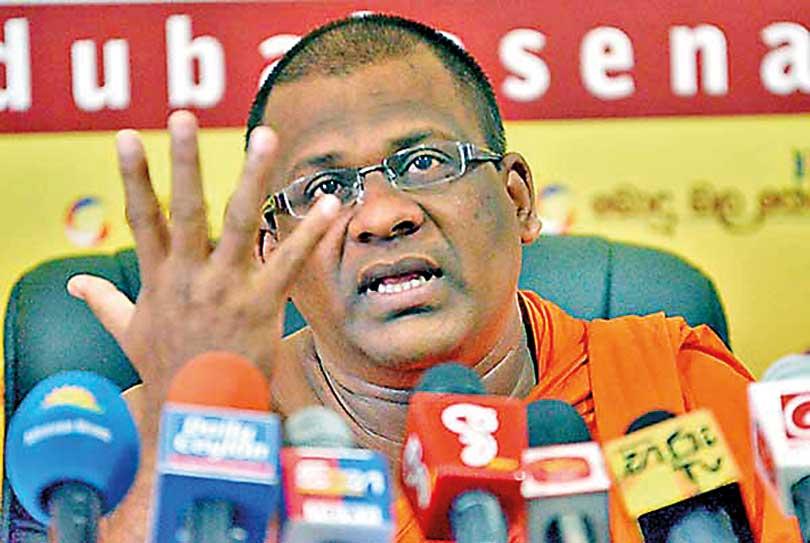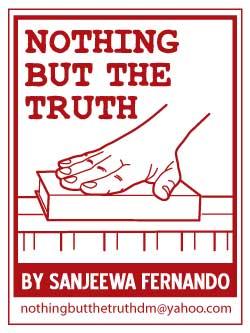Ven. Gnanasara’s release and the death knell of Good Governance

 29 May 2019
29 May 2019 So, Ven. Galagodaaththe Gnanasara Thera, is at large now. The President of the Good Governance mandate, has been instrumental in his release. As to why the monk had to be brought out of prison through the back door is yet another interesting topic. But what is of interest is that it came on the decree of a President who was elected by broad sections of the citizens of this country including the over whelming majority from among the minorities, Muslims included and under the watch of a Prime Minister who boasts of being a neoliberal with tolerant attitudes towards racial and religious minorities and harps on communal and racial harmony. That Gnanasara embodied the anathema of all the values that yahapalanaya project envisaged is hardly debatable.
Any one who has been monitoring the movements of the President for the best part of a past year, would not have been surprised by the decision. In fact, it would have been a surprise had he not pardoned the foul-mouthed monk who is well known for his anti-minority rhetoric and active instigation of Sinhala Buddhist extremist elements against Muslims , specially during the Aluthgama riots under the watch of the Rajapakshe regime.
Contempt of worse kind
But what landed Gnanasara in prison, is not his anti-minority vituperative, per se, but an act of contempt of court, of the highest degree, the likes of which has not been seen in this country. It included threatening the Homagama Magistrate, calling the judge and the prosecution counsel ‘eunuchs’, threatening the wife of the journalist on whose behalf a habeas corpus action was being filed in that court and calling the law itself, as the law of the suddas, and thus not applicable to him.As the Court of Appeal, in dismissing the appeal preferred against the judgement sending Gnanasara to six years initially, reasons out in its judgement, it involves an act of contempt of the worst kind, in a case where he had no involvement or interest at all or standing as the legal jargon goes, to even make an application to intervene. The judgement of the Court of Appeal dismissing the appeal was upheld by the Supreme Court, yet again emphasizing the manner of utter disdain the actions of the monk has exhibited, against judicial dignity and more importantly rule of law.
Meddling with administration of justice
The Presidential pardon, which has come under scrutiny time and again, could be seen as a measure envisaged at correcting a judicial error, or ensuring that humane considerations are taken in to consideration which some times the rigid rules of law might not identify. But that is if one is given to a very charitable explanation of as to why such a provision is in the constitution in the first place. More often, it is seen as a provision that gives way to the whims and fancies of the Executive to meddle with the administration of justice and rule of law.If the decision of the President to pardon Gnanasara leaves no reason to be surprised, the reaction or more precisely, the non-action of the other partner of the government, the UNF would have come as a surprise to some. But even that should not be a surprise to the keen observer of politics and politicking. The race between the PM and the President in the past year in visiting places of Buddhist worship and being in the ‘good books’ of the leading monks, if anything, would have been a clear indication as to which way the wind was blowing. Good governance with reconciliation, communal consensus and non-discriminatory attitude towards the minorities was beginning to take a back seat.
The SLFP and UNP components of the government, which have been locking horns on every matter conceivable, seemed to be in unison in the release of the firebrand monk. In fact the Ministers of Justice as well as Budhdha Sasana, both from the UNP were keen accomplices in the act of the pardon.
The release of the extremist monk was the sign that both groups of the government did not give a darn about the yahapalana mandate given to them in 2015
Hate-speaker extraordinaire
 The recent attacks on Easter Sunday by the Islamic extremist outfit National Thowheed Ja’math seem to have hastened the hand of the President in releasing Gnanasara, who has been engaged in hate speech openly against the minorities, the Muslims in particular, as the Secretary of the Sinhala extremist group Bodu Bala Sena (BBS). It is common knowledge that he received sponsorship from the previous regime, which in the eyes of the many was responsible for the Aluthgama riots which were aimed at the Muslim community. Yet what escapes reason is as to how the Easter Sunday attacks could serve as the catalyst for the release of a monk, who while being in the hallowed saffron robes has been engaged in a brand of politics which would have lubricated, if anything, the radicalization of Muslim youth from mainstream politics to extremist religious views bordering on fanaticism. It is so ironic that at a time when the government was given to blocking social media to prevent hate speech and racially incendiary content from circulating , in a context where , the general Muslim community came under attack from the Sinhala extremist mobs, who call themselves ‘Buddhists’, deciding to release a monk who had been the most infamous hate-speaker in politics in recent years.
The recent attacks on Easter Sunday by the Islamic extremist outfit National Thowheed Ja’math seem to have hastened the hand of the President in releasing Gnanasara, who has been engaged in hate speech openly against the minorities, the Muslims in particular, as the Secretary of the Sinhala extremist group Bodu Bala Sena (BBS). It is common knowledge that he received sponsorship from the previous regime, which in the eyes of the many was responsible for the Aluthgama riots which were aimed at the Muslim community. Yet what escapes reason is as to how the Easter Sunday attacks could serve as the catalyst for the release of a monk, who while being in the hallowed saffron robes has been engaged in a brand of politics which would have lubricated, if anything, the radicalization of Muslim youth from mainstream politics to extremist religious views bordering on fanaticism. It is so ironic that at a time when the government was given to blocking social media to prevent hate speech and racially incendiary content from circulating , in a context where , the general Muslim community came under attack from the Sinhala extremist mobs, who call themselves ‘Buddhists’, deciding to release a monk who had been the most infamous hate-speaker in politics in recent years. There is hardly any perceptible justification available for the government on the release of Gnanasara.
The peace-loving, tolerant and moderate masses who brought the President as well as the PM to power in 2015 certainly deserve an explanation from their government as to why this shocking decision was taken. Showing its impotence to stop the horrendous attacks that killed around three hundred civilians by failing to act on one of the most detailed intelligence communiques in modern times given by a friendly state weeks before, the government showed it s inability to rule and lack of resolute political will by failing to protect the innocent Muslims community from a minor pogrom three weeks after the attacks. They were tell tale signs that the government was anything but ‘good’. But the release of the extremist monk was the sign that both groups of the government did not give a darn about the yahapalana mandate given to them in 2015.
Race is on!
The UNP as well as the SLFP components of the yahapalana government have abandoned the good governance mandate somewhere down the line and the presidential pardon coupled with the acquiescence of the UNP is the trumpet call that yahapalanaya is dead and buried for sure. Up and alive is the race for the winning post in the next elections whether it be Presidential first and General Elections thereafter or vice versa. Both are eager to ingratiate the Sinhala Buddhist sections who are visibly in the pocket of the Rajapaksas.With the release of Galagodaaththe Gnanasara Thera, the government has shown that they are willing to play a dangerous game of communal politics at the expense of the future of the country , which has seen more than enough of its fair share of bloodshed and violence after independence. The government has shown that rule of law, proper administration of justice as well as equality before the law are just labels they used for political expedition and not normative principles that form the core of their principles of governance.
Gnanasara is out, and good governance is... Dead!
